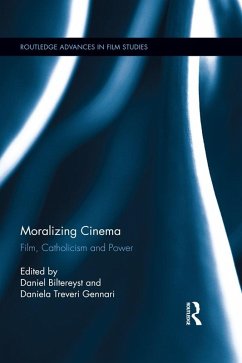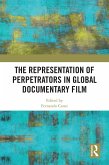Moralizing Cinema (eBook, ePUB)
Film, Catholicism, and Power
Redaktion: Biltereyst, Daniel; Treveri Gennari, Daniela
49,95 €
49,95 €
inkl. MwSt.
Sofort per Download lieferbar

25 °P sammeln
49,95 €
Als Download kaufen

49,95 €
inkl. MwSt.
Sofort per Download lieferbar

25 °P sammeln
Jetzt verschenken
Alle Infos zum eBook verschenken
49,95 €
inkl. MwSt.
Sofort per Download lieferbar
Alle Infos zum eBook verschenken

25 °P sammeln
Moralizing Cinema (eBook, ePUB)
Film, Catholicism, and Power
Redaktion: Biltereyst, Daniel; Treveri Gennari, Daniela
- Format: ePub
- Merkliste
- Auf die Merkliste
- Bewerten Bewerten
- Teilen
- Produkt teilen
- Produkterinnerung
- Produkterinnerung

Bitte loggen Sie sich zunächst in Ihr Kundenkonto ein oder registrieren Sie sich bei
bücher.de, um das eBook-Abo tolino select nutzen zu können.
Hier können Sie sich einloggen
Hier können Sie sich einloggen
Sie sind bereits eingeloggt. Klicken Sie auf 2. tolino select Abo, um fortzufahren.

Bitte loggen Sie sich zunächst in Ihr Kundenkonto ein oder registrieren Sie sich bei bücher.de, um das eBook-Abo tolino select nutzen zu können.
This volume brings together original research on religion and cinema. Contributors look beyond the film text, content, or aesthetics, instead concentrating on the cinema-related actions, strategies, and policies developed by the Catholic Church and Catholic organizations in order to influence cinema.
- Geräte: eReader
- mit Kopierschutz
- eBook Hilfe
- Größe: 19.72MB
Andere Kunden interessierten sich auch für
![Moralizing Cinema (eBook, PDF) Moralizing Cinema (eBook, PDF)]() Moralizing Cinema (eBook, PDF)49,95 €
Moralizing Cinema (eBook, PDF)49,95 €![Journalism and Eyewitness Images (eBook, ePUB) Journalism and Eyewitness Images (eBook, ePUB)]() Mette MortensenJournalism and Eyewitness Images (eBook, ePUB)52,95 €
Mette MortensenJournalism and Eyewitness Images (eBook, ePUB)52,95 €![Biopolitical Media (eBook, ePUB) Biopolitical Media (eBook, ePUB)]() Allen MeekBiopolitical Media (eBook, ePUB)31,95 €
Allen MeekBiopolitical Media (eBook, ePUB)31,95 €![The Representation of Perpetrators in Global Documentary Film (eBook, ePUB) The Representation of Perpetrators in Global Documentary Film (eBook, ePUB)]() The Representation of Perpetrators in Global Documentary Film (eBook, ePUB)41,95 €
The Representation of Perpetrators in Global Documentary Film (eBook, ePUB)41,95 €![Mobility and Migration in Film and Moving Image Art (eBook, ePUB) Mobility and Migration in Film and Moving Image Art (eBook, ePUB)]() Nilgun BayraktarMobility and Migration in Film and Moving Image Art (eBook, ePUB)50,95 €
Nilgun BayraktarMobility and Migration in Film and Moving Image Art (eBook, ePUB)50,95 €![Spanish Cinema in the Global Context (eBook, ePUB) Spanish Cinema in the Global Context (eBook, ePUB)]() Samuel AmagoSpanish Cinema in the Global Context (eBook, ePUB)48,95 €
Samuel AmagoSpanish Cinema in the Global Context (eBook, ePUB)48,95 €![European Civil War Films (eBook, ePUB) European Civil War Films (eBook, ePUB)]() Eleftheria Rania KosmidouEuropean Civil War Films (eBook, ePUB)44,95 €
Eleftheria Rania KosmidouEuropean Civil War Films (eBook, ePUB)44,95 €-
-
-
This volume brings together original research on religion and cinema. Contributors look beyond the film text, content, or aesthetics, instead concentrating on the cinema-related actions, strategies, and policies developed by the Catholic Church and Catholic organizations in order to influence cinema.
Dieser Download kann aus rechtlichen Gründen nur mit Rechnungsadresse in A, B, BG, CY, CZ, D, DK, EW, E, FIN, F, GR, HR, H, IRL, I, LT, L, LR, M, NL, PL, P, R, S, SLO, SK ausgeliefert werden.
Produktdetails
- Produktdetails
- Verlag: Taylor & Francis eBooks
- Seitenzahl: 312
- Erscheinungstermin: 20. November 2014
- Englisch
- ISBN-13: 9781134668380
- Artikelnr.: 41849971
- Verlag: Taylor & Francis eBooks
- Seitenzahl: 312
- Erscheinungstermin: 20. November 2014
- Englisch
- ISBN-13: 9781134668380
- Artikelnr.: 41849971
- Herstellerkennzeichnung Die Herstellerinformationen sind derzeit nicht verfügbar.
Daniel Biltereyst is Full Professor in Film and Cultural Media Studies at Ghent University, Belgium, where he is Head of the Center for Cinema and Media Studies (CIMS). He was the editor of Explorations in New Cinema History (2011) and Cinema, Audiences and Modernity (Routledge, 2012, both with R. Maltby and Ph. Meers), as well as Silencing Cinema (2013, with R. Van de Winkel). Daniela Treveri Gennari is Reader in Film Studies at Oxford Brookes University, UK. Her work on Catholicism and cinema has been published in her monograph Post-War Italian Cinema: American Intervention, Vatican Interests (Routledge 2008) as well as in articles and book chapters. Her current work on audiences - funded by the AHRC - investigates memories of cinema-going and patterns of exhibition in 1950s Italy.
Catholics, cinema and power: An introduction Daniel Biltereyst and Daniela
Treveri Gennari Part 1: Policies 1. Resisting the lure of the modern world.
Catholics, international politics, and the establishment of the
International Catholic Office for Cinema (1918-1928) Guido Convents 2. The
Roman Catholic Church, cinema and the 'culture of dialogue': Italian
Catholics and the movies after the Second World War Dario Edoardo Viganò
3. The rise and fall of Catholic Hollywood, or from the Production Code to
The Da Vinci Code Thomas Doherty 4. Catholicism and Mexican cinema. A
secular state, a deeply conservative society and a powerful Catholic
hierarchy Francisco Peredo Castro Part 2: Leaders 5. Jean Bernard's fight
for 'good' cinema in Luxembourg Paul Lesch 6. An alternative way of
moralizing cinema: Father Flipo's remedy for the Catholic Church's
propaganda failure in France (1945-1962) Mélisande Leventopoulos 7. A
triple alliance for a Catholic neorealism. Roberto Rossellini according to
Felix Morlion, Giulio Andreotti and Gian Luigi Rondi Elena Dagrada Part 3:
Technology and Production 8. A Catholic voice in talking pictures: the
International Eidophon Company (1930-1934) Karel Dibbetts 9. Pius XII as
actor and subject: on the representation of the Pope in cinema during the
1940s and 1950s Federico Ruozzi 10. The failed project of a Catholic
Neorealism: on Giulio Andreotti, Felix Morlion and Roberto Rossellini
Tomaso Subini Part 4:Censorship and control 11. Protectionism and Catholic
film policy in twentieth-century Ireland Kevin Rockett 12. A case of
entente cordiale between State and Church: Catholics and film control in
Argentina (1954-1984) Maria Elena de las Carrera 13. The 'Ideal Film'. On
the transformation of the Italian Catholic film and media policy in the
1950s and the 1960s Mariagrazia Fanchi Part 5: Exhibition and Cinema-going
experiences 14. Separating the sheep from the goats: gendering space in the
Cinema Auditorium in Rucphen (1929) Thunnis van Oort 15. "I think Catholics
didn't go to the cinema": Catholic film exhibition strategies and
cinema-going experiences in Belgium, 1930s-1960s Daniel Biltereyst 16.
Moralizing cinema while attracting audiences: Catholic film exhibition in
post-war Rome Daniela Treveri Gennari
Treveri Gennari Part 1: Policies 1. Resisting the lure of the modern world.
Catholics, international politics, and the establishment of the
International Catholic Office for Cinema (1918-1928) Guido Convents 2. The
Roman Catholic Church, cinema and the 'culture of dialogue': Italian
Catholics and the movies after the Second World War Dario Edoardo Viganò
3. The rise and fall of Catholic Hollywood, or from the Production Code to
The Da Vinci Code Thomas Doherty 4. Catholicism and Mexican cinema. A
secular state, a deeply conservative society and a powerful Catholic
hierarchy Francisco Peredo Castro Part 2: Leaders 5. Jean Bernard's fight
for 'good' cinema in Luxembourg Paul Lesch 6. An alternative way of
moralizing cinema: Father Flipo's remedy for the Catholic Church's
propaganda failure in France (1945-1962) Mélisande Leventopoulos 7. A
triple alliance for a Catholic neorealism. Roberto Rossellini according to
Felix Morlion, Giulio Andreotti and Gian Luigi Rondi Elena Dagrada Part 3:
Technology and Production 8. A Catholic voice in talking pictures: the
International Eidophon Company (1930-1934) Karel Dibbetts 9. Pius XII as
actor and subject: on the representation of the Pope in cinema during the
1940s and 1950s Federico Ruozzi 10. The failed project of a Catholic
Neorealism: on Giulio Andreotti, Felix Morlion and Roberto Rossellini
Tomaso Subini Part 4:Censorship and control 11. Protectionism and Catholic
film policy in twentieth-century Ireland Kevin Rockett 12. A case of
entente cordiale between State and Church: Catholics and film control in
Argentina (1954-1984) Maria Elena de las Carrera 13. The 'Ideal Film'. On
the transformation of the Italian Catholic film and media policy in the
1950s and the 1960s Mariagrazia Fanchi Part 5: Exhibition and Cinema-going
experiences 14. Separating the sheep from the goats: gendering space in the
Cinema Auditorium in Rucphen (1929) Thunnis van Oort 15. "I think Catholics
didn't go to the cinema": Catholic film exhibition strategies and
cinema-going experiences in Belgium, 1930s-1960s Daniel Biltereyst 16.
Moralizing cinema while attracting audiences: Catholic film exhibition in
post-war Rome Daniela Treveri Gennari
Catholics, cinema and power: An introduction Daniel Biltereyst and Daniela
Treveri Gennari Part 1: Policies 1. Resisting the lure of the modern world.
Catholics, international politics, and the establishment of the
International Catholic Office for Cinema (1918-1928) Guido Convents 2. The
Roman Catholic Church, cinema and the 'culture of dialogue': Italian
Catholics and the movies after the Second World War Dario Edoardo Viganò
3. The rise and fall of Catholic Hollywood, or from the Production Code to
The Da Vinci Code Thomas Doherty 4. Catholicism and Mexican cinema. A
secular state, a deeply conservative society and a powerful Catholic
hierarchy Francisco Peredo Castro Part 2: Leaders 5. Jean Bernard's fight
for 'good' cinema in Luxembourg Paul Lesch 6. An alternative way of
moralizing cinema: Father Flipo's remedy for the Catholic Church's
propaganda failure in France (1945-1962) Mélisande Leventopoulos 7. A
triple alliance for a Catholic neorealism. Roberto Rossellini according to
Felix Morlion, Giulio Andreotti and Gian Luigi Rondi Elena Dagrada Part 3:
Technology and Production 8. A Catholic voice in talking pictures: the
International Eidophon Company (1930-1934) Karel Dibbetts 9. Pius XII as
actor and subject: on the representation of the Pope in cinema during the
1940s and 1950s Federico Ruozzi 10. The failed project of a Catholic
Neorealism: on Giulio Andreotti, Felix Morlion and Roberto Rossellini
Tomaso Subini Part 4:Censorship and control 11. Protectionism and Catholic
film policy in twentieth-century Ireland Kevin Rockett 12. A case of
entente cordiale between State and Church: Catholics and film control in
Argentina (1954-1984) Maria Elena de las Carrera 13. The 'Ideal Film'. On
the transformation of the Italian Catholic film and media policy in the
1950s and the 1960s Mariagrazia Fanchi Part 5: Exhibition and Cinema-going
experiences 14. Separating the sheep from the goats: gendering space in the
Cinema Auditorium in Rucphen (1929) Thunnis van Oort 15. "I think Catholics
didn't go to the cinema": Catholic film exhibition strategies and
cinema-going experiences in Belgium, 1930s-1960s Daniel Biltereyst 16.
Moralizing cinema while attracting audiences: Catholic film exhibition in
post-war Rome Daniela Treveri Gennari
Treveri Gennari Part 1: Policies 1. Resisting the lure of the modern world.
Catholics, international politics, and the establishment of the
International Catholic Office for Cinema (1918-1928) Guido Convents 2. The
Roman Catholic Church, cinema and the 'culture of dialogue': Italian
Catholics and the movies after the Second World War Dario Edoardo Viganò
3. The rise and fall of Catholic Hollywood, or from the Production Code to
The Da Vinci Code Thomas Doherty 4. Catholicism and Mexican cinema. A
secular state, a deeply conservative society and a powerful Catholic
hierarchy Francisco Peredo Castro Part 2: Leaders 5. Jean Bernard's fight
for 'good' cinema in Luxembourg Paul Lesch 6. An alternative way of
moralizing cinema: Father Flipo's remedy for the Catholic Church's
propaganda failure in France (1945-1962) Mélisande Leventopoulos 7. A
triple alliance for a Catholic neorealism. Roberto Rossellini according to
Felix Morlion, Giulio Andreotti and Gian Luigi Rondi Elena Dagrada Part 3:
Technology and Production 8. A Catholic voice in talking pictures: the
International Eidophon Company (1930-1934) Karel Dibbetts 9. Pius XII as
actor and subject: on the representation of the Pope in cinema during the
1940s and 1950s Federico Ruozzi 10. The failed project of a Catholic
Neorealism: on Giulio Andreotti, Felix Morlion and Roberto Rossellini
Tomaso Subini Part 4:Censorship and control 11. Protectionism and Catholic
film policy in twentieth-century Ireland Kevin Rockett 12. A case of
entente cordiale between State and Church: Catholics and film control in
Argentina (1954-1984) Maria Elena de las Carrera 13. The 'Ideal Film'. On
the transformation of the Italian Catholic film and media policy in the
1950s and the 1960s Mariagrazia Fanchi Part 5: Exhibition and Cinema-going
experiences 14. Separating the sheep from the goats: gendering space in the
Cinema Auditorium in Rucphen (1929) Thunnis van Oort 15. "I think Catholics
didn't go to the cinema": Catholic film exhibition strategies and
cinema-going experiences in Belgium, 1930s-1960s Daniel Biltereyst 16.
Moralizing cinema while attracting audiences: Catholic film exhibition in
post-war Rome Daniela Treveri Gennari







